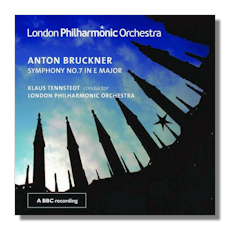
The Internet's Premier Classical Music Source
Related Links
- Bruckner Reviews
- Latest Reviews
- More Reviews
-
By Composer
-
Collections
DVD & Blu-ray
Books
Concert Reviews
Articles/Interviews
Software
Audio
Search Amazon
Recommended Links
Site News
 CD Review
CD Review
Anton Bruckner

Symphony #7 "Lyric"
London Philharmonic Orchestra/Klaus Tennstedt
London Philharmonic LPO-0030 63:07
Though the London Philharmonic Orchestra has a long and respected history, where they rank in relationship to the other major orchestras of London is up for debate. The 1980's were arguably not a great time for the orchestra technically speaking, despite impassioned leadership from artists as diverse as Sir Georg Solti and Klaus Tennstedt. The latter was a shy and often sickly man, but a conductor of uncommon spirit and warmth. He was loved by audiences and orchestras alike, and with a great ensemble under studio conditions, he was capable of great things. His live efforts show greater spontaneity and feeling, but also suffer from some sloppy playing and questionable ensemble. So it proves here.
Tennstedt was a fabulous Mahler conductor, with a unique ability to meld a sure grasp of the music's structure and humanity. You would think that this would also make him ideal for Bruckner, and that's mostly true. I was happy with a live Fourth on this same label, impressed by the conductor's ability to capture the dramatic sweep of the music within a convincing framework. This Seventh has many of the same qualities. While the playing is assured and quite good overall, it is the orchestra that takes this particular disc out of the running. There are some very unfortunate sounds that come from the brass, especially in the first movement. In fact, some were so noticeable that I actually backtracked to make sure I had heard them correctly. The strings also have some questionable moments, but the winds and overall ensemble are laudable.
Releases like this are troubling. Tennstedt's later health made his appearances extremely rare, and I understand why BBC Radio 3 would have wanted to preserve his occasional concerts. But Tennstedt was not a podium giant like Carlos Kleiber, and did not have an inherent ability to change the personality of any orchestra he wished. That put him very much at the mercy of his players, who were often unable to translate their commitment to him into exceptional music making. His "Pastoral" (Beethoven) and "Romantic" (Bruckner) are both notable for differing positively from his work in the studio. This is less successful, and worse, tells us nothing we didn't know about conductor and orchestra. Tennstedt's live Mahler on this label is astonishing, and that is worth buying. Despite gathering strength as it progresses, this is not a great Bruckner Seventh, and isn't even the greatest on this label. That honor goes to Stanisław Skrowaczewski. So again, I understand why this was recorded. But I'm not entirely sure that it should have been released.
Copyright © 2015, Brian Wigman




















